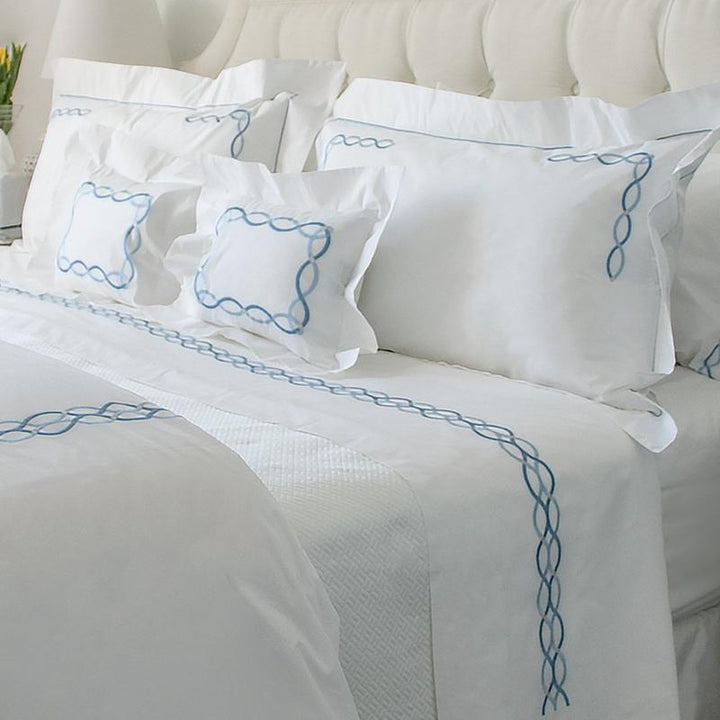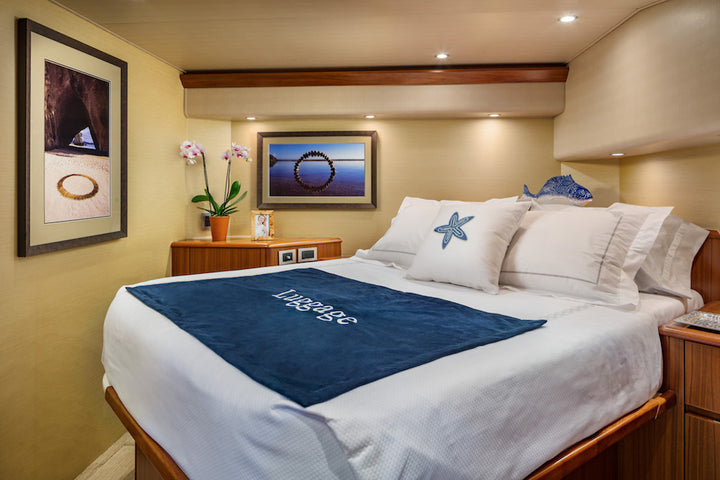It can be wonder full having a luxury bed set, but making sure that your linens are well taken care of is important in ensuring longevity. Follow the Pioneer Linen laundry guide below or call our wonderful staff at 800-207-5463 for more information.
For any linen product that doesn’t specify dry cleaning on it, we recommend laundering it at home. We also recommend that you wash any linens you purchase before use, especially if it uses polyester. Avoid washing natural fabrics with anything polyester as they can ruin the fabric’s smoothness and make it less comfortable. Ensure that you are not washing your linens together with anything containing buttons or zippers, as they can also damage them. Laundry detergent should gentle on your linens and should avoid using any fabric whiteners or detergents with “bluing agents”, especially for colored sheets, as it may cause them to fade quicker.
If your fabric is made from cotton, repeated washes could shrink it by 4% to 8% of its original size. If you’re using higher temperatures for your wash, this can shrink your linens even more.
Common Questions About Laundering Linens
Can Linen Products Go in The Dryer?
Yes, linen can safely be put in the dryer, provided that safety instructions are followed. Be careful that you aren't using excessive heat, as this can cause irreparable damage. Aside from damage, high temperatures can also cause additional wrinkles. Even when dried properly, over time, linen will eventually have creases, though natural wrinkles may add to the material's earthy appearance.
Can Linen be Dry Cleaned?
Same as with dryers, dry cleaning can be an efficient method (as well as cost effective), so long as the drying isn't too hot. Some dry cleaning may also use artificial chemicals, which must be carefully selected so that it will not affect the material. Make sure that you are either dry cleaning your linens yourself or having them done by a professional.
Does Linen Shrink in the Wash?
Yes, even when washed correctly, linen will usually shrink 3-10% after the first wash. You can try to decrease the shrinkage by washing it in cold water before washing it with its care instructions. Should your linens shrink too much, you can salvage them by washing and drying them again at the correct temperature, then using an iron to lightly pull and expand the linen fibers back into their original shape.
What to Know About Washing Bed Linens
Generally, you’ll want you to make sure you don’t wash light and dark colors at the same time. Regardless of whatever material you are using, whether it’s cotton, linen, or an in-between blend, you’ll want to wash them in warm water with a light laundry detergent, then run it through a cold rinse.
Once the bed linens are washed, quickly remove them in order to prevent wrinkling. Shaking them out before placing them in the dryer also reduces wrinkles. We recommend using Lavender Lady Laundry Wash by Le Blanc. Its neutral pH balance makes it strong on stains, yet gentle on luxury fabrics.

(Grande Hotel Bed Linens by SFERRA)
What to Know about Washing Bath Linens
Depending on the type of towel you have, multiple washings can have a variety of different effects on them, especially if it is a type of cotton. Most towels will become stronger after every wash, but you should be following the care tag to the letter in case you’re not sure.
Terrycloth Towels: By washing terry cloth towels multiple times, you may notice that it becomes far more absorbent and softer than before. These towels are made of 100% cotton, so they are likely to last you a very long time, providing you care for them properly.
Egyptian Cotton Towels: Generally, takes longer to dry due to its highly absorbent long fibers, though they should dry quicker after enough washes.
Turkish Cotton Towels: Gets softer and more absorbent but still maintains its quick drying capabilities.
Pima Cotton Towels: Resists stretching or “pilling” after multiple washes and still retains its softness.
(Kiran Bath Towels by Matouk Collection)
What to Know About Washing Table Linens
Like bed linens, we recommend washing table linens in warm water with a delicate detergent like Le Blanc, and rinse with cold water. DO NOT use fabric softener, as it reduces absorbency and can build up residue. Like with bed linens, we recommend taking it out immediately after the wash then shaking it out before drying it.
Make sure not to leave your table linens outside unless it is drying. They should always be stored when they are not in use and only brought out for special events.
(Pondicherry Table Linens by SFERRA)
How to Dry Your Luxury Linens
Drying your linens outside may be the most time-consuming, but it leaves them relatively wrinkle-free and is better than any dryer. If you must use one, there are some dryer settings that can produce similar results. Use the “permanent press” cycle, as has a cooldown phase for reducing the chance of wrinkles. There is also an air cycle that tumbles your linens without using heat. When you remove your linens from the dryer, be sure to finger-press detailed such as flanges and smooth out the entire sheet, pillowcase, or cloth.
How to Iron Your Luxury Linens
Ironing your linens is the best way to ensure that you avoid getting any wrinkles on any of your linens. DO NOT use starch spray, as it can attract silverfish. Depending on what linen you are ironing, try these methods:
Table Linens: Iron your damp table linens. Take special care ironing over any three-dimensional woven patterns, as the steam should enhance them and help the stick out more.
Bedding: Your bed linens should also be ironed while they are damp. If your bedding is embroidered, iron the opposite side to not damage the embroidery. The care label should tell you more about how to handle it.
How to Store Your Luxury Linens
Make sure your linens are stored on a flat surface, preferably not wood, as some can contain damaging oils. DO NOT leave them anywhere they would be exposed to sunlight.
How to Take Care of Down Products
Any duvets, pillows, or comforters that use goose-down need to be fluffed daily. Any silk products should ONLY be dry cleaned. Same as regular linens, down products should be washed with warm water and mild detergent. Any single-spot stains can be handled by just soap and damp cloth.
Avoid using any top-loading washers, as those can damage cotton covers. You can dry them either by hanging them outside or using tumble dry on medium heat. DO NOT store them in plastic bags, and make sure they are completely dry before storage.
What to Expect from Pioneer Linens
We hope you’ve enjoyed reading through our laundry guide. At Pioneer Linens, our team is dedicated to providing you with the best service possible. That means helping you find the brands and styles you want, for the product you are looking for. If you have any more questions or need consultation about any of our bed, table, visit our store in 210 Clematis Street in West Palm Beach, call us 800-207-5463 or email customerservice@pioneerlinens.com for more information.







